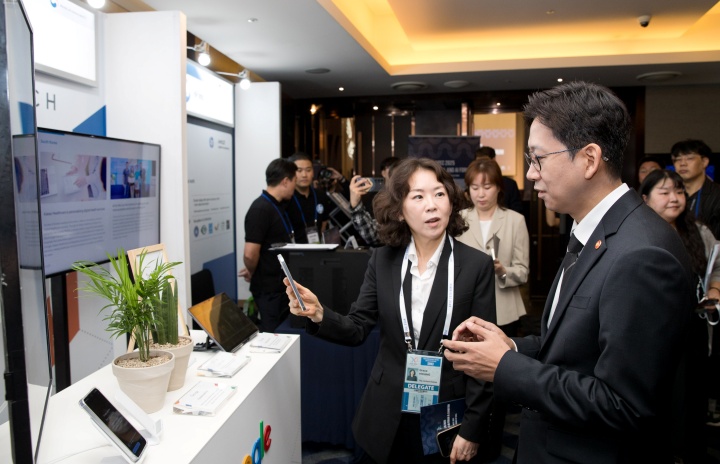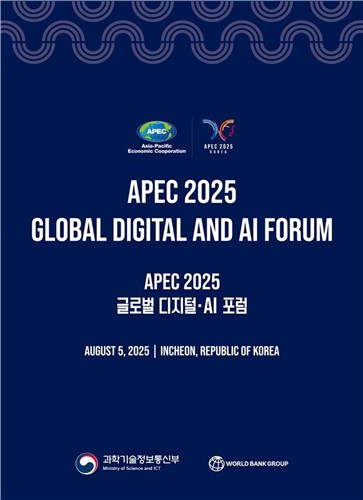Experts from APEC economies and global organizations gather in Incheon to discuss the future of digital and AI ecosystems
Focus on collaborative policies and inclusive strategies to bridge digital divides and promote sustainable transformation

On August 5 in Incheon, the Ministry of Science and ICT of the Republic of Korea, together with the World Bank, co-hosted the APEC Global Digital and AI Forum at the Sheraton Grand Hotel. The forum was held as a follow-up to the Digital and AI Ministers’ Meeting, bringing together government officials and private sector experts from key Asia-Pacific economies to assess the development of digital and AI ecosystems and explore avenues for international collaboration.
The World Bank, which has consistently led efforts to advance the inclusive adoption and responsible use of digital and AI technologies, placed special emphasis at this event on the expansion of capacity-building and policy innovation initiatives worldwide.
Jointly organized by the Ministry of Science and ICT and the World Bank, the forum was designed to facilitate not only the exchange of information and policy, but also to promote sustainable digital transformation globally, extending beyond the APEC region.
Themed “Preparing for APEC’s Innovative Digital and AI Future,” the forum consisted of three main sessions.
The first session focused on enhancing digital and AI connectivity as well as resilience. Song Sang Hoon, Director-General for ICT Policy at the Ministry of Science and ICT, delivered the keynote address. The panel, moderated by Casey Torgersen, Program Leader at the World Bank, included Wilson White, Vice President at Google; Yang Seung Hyun, Head of SK AI R&D Center; and Pei-Khan Chen, Founder of CyCraft Technology. The experts discussed bridging digital divides and strengthening social resilience.

The second session highlighted strategies for public sector innovation to foster an inclusive digital society. The session began with a keynote speech from Song Zhijun, Vice Minister of China’s Ministry of Industry and Information Technology, and featured in-depth discussions with Kim Deuk Joong, Vice President of NIPA; Jason Alford, Country Manager of the World Bank Korea Office; and Sandy Koonbattanagan, Asia-Pacific Policy Director at OpenAI, on practical ways to reduce social inequality and extend benefits to all.
In the third session, the focus turned to innovation in AI to address shared global challenges. After the keynote by Michael Kratsios, Director of the White House Office of Science and Technology Policy, the panel—chaired by Professor Seo Min Joon of KAIST—included Anthony Cook, Vice President at Microsoft; Simon Milner, Vice President at Meta; and Calista Redmond, Vice President at Nvidia, who shared diverse perspectives on leveraging AI for real-world problem-solving.
Kim Sang Boo, Vice President of the World Bank, remarked, “The future of AI—whether it leads to inclusion or division—depends on our choices. Through cooperation among APEC member states, we will work towards building a more trustworthy digital society.”
Baek Kyung Hoon, Minister of Science and ICT, added, “This forum was a meaningful opportunity for international organizations, global companies, and public sector entities to discuss joint response strategies. We look forward to continued collaboration among stakeholders worldwide to shape a digital and AI future for all.”
Note “This article was translated from the original Korean version using AI assistance, and subsequently edited by a native-speaking journalist.”
Photo=Republic of Korea Policy Briefing
추천 뉴스
- 1 Danuri Achieves Milestone as Fourth Nation to Complete Global Lunar Map in Three Years Only three years after the launch of South Korea’s first lunar orbiter, Danuri, the nation has joined the select ranks of just four countries to have successfully completed a comprehensive global map of the Moon. On August 5, the Korea Aerospace Administration officially announced Danuri’s achieveme
- 2 JD1 (Jeong Dong-won) Embodies J.Y. Park’s Groove in Bold R&B Remake of Easy Lover In the summer of 2025, an unexpected and fascinating partnership emerged in the Korean music industry. Jeong Dong-won, the 18-year-old trot prodigy who shot to fame through "Mr. Trot," joined forces with J.Y. Park, the living K-pop legend, now 53. Their paths crossed when Jeong Dong-won decided to r
- 3 Jin Young Ko Reclaims Top Spot in Women’s Golf Rankings, Ending Nelly Korda’s 72-Week Reign There has been a major shift at the top of the women’s golf world rankings.As announced on August 5, Jin Young Ko of Thailand has returned to the number one spot in the Women’s Golf World Ranking after amassing an impressive 404.83 points, overtaking American golfer Nelly Korda, who now stands secon
- 4 South Korea’s U-21 Volleyball Teams Set to Battle World’s Best, Eye First Round of 16 in 14 Years South Korea’s men’s and women’s national U-21 volleyball teams are gearing up for fierce competition at this year’s World Championships, with the women’s team vying for their first round of 16 berth in 14 years.The women’s U-21 squad, under Head Coach Jeong Jin, will compete in Surabaya, Indonesia f
- 5 Star Chefs Lee Yeon-bok, Raymond Kim, and Jung Ho-young Face Off in Fiery Island Cooking Showdown The latest episode of MBC’s popular variety program “If You Rest, It’s a Relief” (known as “Pookdahaeng”) once again captivated viewers’ eyes and appetites with a fierce culinary battle between top chefs stranded on a deserted island.The 59th episode, aired on the 4th, brought together the show’s or
- 6 Hanwha Eagles’ Hold on First Place Threatened by LG Twins and Lotte Giants Can the Hanwha Eagles maintain their hold on first place?The Hanwha Eagles currently lead the KBO league standings, having played 100 games this season with a record of 59 wins, 3 draws, and 38 losses (winning percentage: .608). Hot on their heels are the LG Twins, who are just behind with a winning
- 7 aespa Unveils Band-Themed Comeback With Sixth Mini Album ‘Rich Man’ The girl group aespa has revealed the schedule poster for their highly anticipated sixth mini album, ‘Rich Man’, marking their return with an innovative band concept.At midnight on the 5th, aespa shared the schedule poster for ‘Rich Man’ through their official social media channels. The poster featu
- 8 Rival Parties Clash Over Broadcasting Act, Filibuster Returns After One Year On August 4, rival parties in the National Assembly reignited fierce confrontation over proposed amendments to the Broadcasting Act, leading to the return of a legislative filibuster for the first time in nearly a year.The Democratic Party of Korea described the bill as legislation “returning broadc
- 9 Purple Kiss’ Sudden Disbandment Raises Unanswered Questions for K-pop Industry Less than three weeks ago, Purple Kiss released their latest single, with grand announcements of an upcoming English-language album and a North American tour. Yet today (the 4th), the girl group announced they would cease activities by November, marking a sudden exit after four years of leaving an i
- 10 'Anytime We Can' Star Hyun Bong-sik Reveals Surprising Frustration with Fellow Actor Yoo Yeon-seok On the upcoming 33rd episode of SBS’s variety show ‘Anytime We Can’, actor Hyun Bong-sik makes headlines with his candid revelation of feeling slighted by his close friend and fellow 1984-born actor, Yoo Yeon-seok.The episode, airing on August 5, features Kim Sung-kyun and Hyun Bong-sik teaming up a
